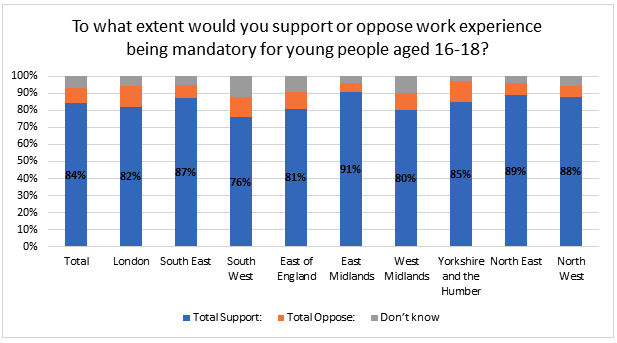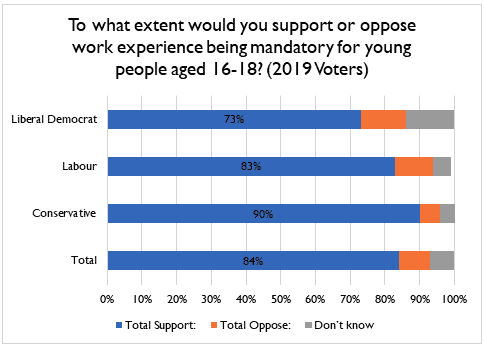Universal Work Experience Gains Public Support In New Report

The recent report by the Edge Foundation provides insight into the appetite for reform within 16 -19 education, highlighting findings that demand immediate attention from employers, educators, and policymakers alike.
Here’s a breakdown of the key revelations:
- 1. Perceptions of the Education System: A significant proportion of voters express disillusionment with the current state of our education system. Shockingly, over half of the respondents (52%) believe that our system fails to adequately prepare young people for the realities of the working world. Moreover, 37% feel that today’s graduates are less equipped for employment compared to their counterparts from two decades ago.
- 2. Widespread Support for the Introduction of Universal Work Experience: There was widespread national support for mandatory work experience, particularly in the East Midlands (91%) and the North West (89%). On average, 8 out of 10 people (84%) back mandatory work experience for 16-18-year-olds, recognising its role in tackling youth unemployment and enhancing soft skills valued by employers.

Interestingly, this support for mandatory work experience cut across party lines; the response shows strong support across a broad spectrum of the electorate, indicating a consensus on the perceived benefits of such a reform.
Notably, 84% of all voters are in favour, with a higher approval rate of 90% among 2019 Conservative voters, which, when considered alongside the regional data, suggests that closing regional skill gaps is still an ongoing concern.

2019 Labour voters also show robust support at 83%, nearly mirroring the general populace, indicating a broad consensus on the importance of integrating practical workplace skills into youth education. However, support among Liberal Democrat voters, while still a majority, is somewhat lower at 73%.
Generally, there is a positive public appetite for integrating practical work experiences into the educational framework for Key Stage 5, recognising it as crucial for enhancing career readiness.
Our charity, responding to the DfE’s ABS consultation, emphasised the imperative of aligning the curriculum with the demands of the future workforce.
Work experience is a powerful catalyst in shaping young people’s career trajectories, particularly evident in the motivation it instils in Free School Meal recipients. Hence, we advocate for integrating high-quality employer interactions, including work experience opportunities, within the Education, Employment, and Progression (EEP) framework.
However, as panellists highlighted in the insightful webinar accompanying the Edge Foundation report’s launch, our reform efforts must extend beyond post-16 education. It’s essential to overhaul the pre-16 curriculum to ensure students access a broad and balanced learning experience.
Creativity should drive curriculum design, fostering an enjoyable learning environment that is adaptive to individual interests and aspirations.
The Edge Foundation report serves as a clarion call for education reform. By prioritising essential skills development, facilitating meaningful work experiences, and providing fully funded comprehensive career guidance, we can equip young people with the tools they need to make informed progression choices and be better prepared for life and for work.